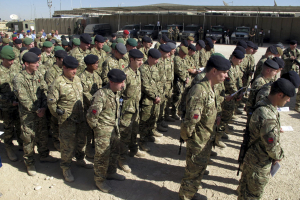Russia is ready "to show flexibility" on the possible easing of sanctions imposed on Afghanistan's Taliban insurgents by the U.N. Security Council, TASS news agency quoted a senior Russian diplomat on Tuesday as saying.
Russia supports Afghanistan government policy aimed at achieving national reconciliation, Zamir Kabulov, a department chief at Russia's Foreign Ministry and President Vladimir Putin's special envoy on Afghanistan, was quoted as saying.
"We are ready to approach in a flexible way the issues of a possible easing of the regime of sanctions under Security Council Resolution 1988 on the Taliban, if this does not contradict Afghanistan's national interests," he said.
"No one is talking today about achieving a victory by military means over the Taliban, while the implementation of the national reconciliation policy would in practice mean their return to power," Kabulov said.
He appeared to be suggesting that major powers should consider an accommodation with the Taliban to stop the spread of rival Islamic State militants, deemed a much bigger, international menace by the West.
Security Council Resolution 1988 passed in 2011 branded the Taliban insurgency a threat to international peace and imposed asset freezes, travel bans and other curbs on entities and individuals designated as associated with the Taliban.
But militants from Islamic State, which has seized parts of Iraq and Syria, recently entered eastern Afghanistan and come into conflict with the Taliban, which has labeled Islamic State as "barbaric" in areas that it has captured.
Kabulov said last week that Russian interests in Afghanistan "objectively coincide" with those of the Taliban movement in the fight against Islamic State. He also said Russia had established communication channels to exchange information with the Taliban.
Moscow, currently conducting a bombing campaign in Syria it says is aimed at Islamic State forces, has been concerned about the possible spread of Islamic State from Afghanistan into neighboring ex-Soviet states like Tajikistan, Uzbekistan and Turkmenistan.
Groups associated with Islamic State have made growing inroads in Afghanistan, attracting fighters and support away from disenchanted members of the Taliban.
They have been battling government forces and the Taliban in a challenge for supremacy of the Islamist insurgency, and its rise has caused alarm outside Afghanistan, with U.S. commanders citing the movement as a reason to delay troop withdrawals.

















